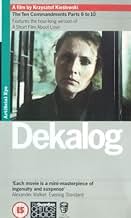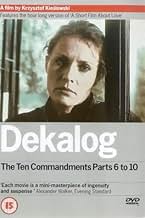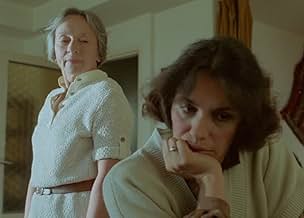Dekalog, osiem
- Episode aired Jun 22, 1990
- TV-MA
- 56m
IMDb RATING
7.5/10
3.9K
YOUR RATING
A researcher meets a professor and reveals herself as the child to whom she refused shelter during World War II.A researcher meets a professor and reveals herself as the child to whom she refused shelter during World War II.A researcher meets a professor and reveals herself as the child to whom she refused shelter during World War II.
- Director
- Writers
- Stars
Jerzy Schejbal
- Ksiadz
- (credit only)
Marek Kasprzyk
- Student
- (uncredited)
- Director
- Writers
- All cast & crew
- Production, box office & more at IMDbPro
7.53.9K
1
2
3
4
5
6
7
8
9
10
Featured reviews
What a shame ! ! ! Mysterious are the vagaries of human mind.
Dekalog 8: "Thou Shalt Not Bear False Witness" is a short film which will surely move any human being with heart to tears.By making this film,one of the greatest masters of Polish cinema Kieslowski has given birth to a highly mature work of art which needs to be seen at regular intervals to fathom the true meaning of human existence found in human heart.One can learn that there is no yardstick by which greatness or wickedness of an individual,a society,a nation or a religion can be measured.Everybody has reasons to accept or decline a good action."Dekalog,Osiem" suggests that individual sense prevails sometimes over a good act.Rules have to be broken on some occasions to save precious,human lives.It is a human instinct that old memories cannot be separated from human soul.This is the reason why old memories induce people to visit places where they could have died,see a house where they were hidden,meet a person who saved a life.This short film is remarkable for its depiction of young Polish university students.It is a good sign that young generation have been shown as interested in tackling ethical and moral questions.It is hard to say whether Kieslowski had ideas about the liberation of communist Poland in his mind when he was making this film.
'Dekalog': Part 8- The difficulties of truth amid evil and the sanctity of truth
'Dekalog' is a towering achievement and a televisual masterpiece that puts many feature films to shame, also pulling off a concept of great ambition brilliantly. Although a big admirer of Krzysztof Kieślowski (a gifted director taken from us too early), and who has yet to be disappointed by him, to me 'Dekalog' and 'Three Colours: Red' sees him at his best.
All of 'Dekalog's' episodes have so many great things, and it is an example of none of the lesser episodes being bad. This is testament to the high quality of 'Dekalog' as an overall whole and how brilliant the best episodes are.
Episode 8 may be one of the weaker 'Dekalog' episodes, but it is still very good. With it being the simplest of all ten stories, it is not quite as thematically rich or as emotionally impactful as some of the others, and the other commandments explored with a little more naturalness.
Every single one of 'Dekalog's' episodes are exceptionally well made. The production values in Episode 8 are as ever atmosphere-enhancing, beautiful and haunting to look at and fascinating, definitely cannot be faulted on the technical front. The direction is quietly unobtrusive, intelligently paced and never too heavy, and the music is suitably intricate.
The characters are still interesting and their interactions and relationships with each other resonate. Even though most of the other episodes are richer thematically, Episode 8's themes are still explored intelligently and without any preachiness and there are some very atmospheric and moving moments (just not quite as much as the previous episodes). The acting is superb as to be expected, with complexity and nuances by the bucket-load.
To conclude, may be one of the weaker 'Dekalog' episodes but it is still very good. 8/10 Bethany Cox
All of 'Dekalog's' episodes have so many great things, and it is an example of none of the lesser episodes being bad. This is testament to the high quality of 'Dekalog' as an overall whole and how brilliant the best episodes are.
Episode 8 may be one of the weaker 'Dekalog' episodes, but it is still very good. With it being the simplest of all ten stories, it is not quite as thematically rich or as emotionally impactful as some of the others, and the other commandments explored with a little more naturalness.
Every single one of 'Dekalog's' episodes are exceptionally well made. The production values in Episode 8 are as ever atmosphere-enhancing, beautiful and haunting to look at and fascinating, definitely cannot be faulted on the technical front. The direction is quietly unobtrusive, intelligently paced and never too heavy, and the music is suitably intricate.
The characters are still interesting and their interactions and relationships with each other resonate. Even though most of the other episodes are richer thematically, Episode 8's themes are still explored intelligently and without any preachiness and there are some very atmospheric and moving moments (just not quite as much as the previous episodes). The acting is superb as to be expected, with complexity and nuances by the bucket-load.
To conclude, may be one of the weaker 'Dekalog' episodes but it is still very good. 8/10 Bethany Cox
Maria Koscialkowska
Like "Dekalog, jedem", it is one of the most powerful episode of the serie for me. The admirable performance of Maria Koscialkowska, the beautiful work of Teresa Marczewska as Elzbieta , reminding the performance of Krystyna Janda in "Dekalog ,dwa" are the lead virtues. The reference to the dilemma of Dorota Geller is, for same reason, a significant clue. In same measure, it is an episode about Shoah and its shadows, about fear and about resurrection of past price. About a decision and its profound, hidden roots. About the expected word. A special film. For the exploration of the memories of the viewer.
Dekalog 8
This is not a particularly remarkable Dekalog. But it's simple and lays out as clearly as any of them the blueprint that Kieslowski worked towards, both in these 10 Dekalogs, the longer short films, and it remains to be seen I guess if he perfects and evolves this for the color trilogy.
The twofold blueprint is that we have a world and a story that takes place. The world across the 10 Dekalogs is the same few months in the life of an apartment block, ostensibly the same few months the show aired. Here for example we have the story of Dekalog 2 with the dying husband laid through as something that happened in the same neighborhood.
Anyway this world is open-ended and ebbs forward and back with what the protagonists have set in motion around them. The most interesting thing about Dekalog is Kieslowski's ability, snippets of it in TV form, to render that visually as movements in emotional air.
The story each time focuses on a moral issue, here it's guilt, tied to the Polish experience of WWII and how it reverberates still. But time and again the story is reduced to two characters forlornly baring themselves to each other in a room, explaining or avoiding to. Bergman.
Here we have it clearly: the notion (during a class on ethics) of stories where readers (viewers) have to surmise the motivation of characters.
One of these viewers inside the class begins narrating her own story that begs for ethical interpretation: a Jewish girl in need of shelter from Nazi horror who was turned away from a Catholic Polish home.
Kieslowski attempts to visually inhabit a corner of this story (no more is allowed by the TV format): the old woman returns to the same WWII home where the story took place, the girl is lost and she looks for her distraught. She was the protagonist in that story, now inhabiting the memory of it.
Then we are back in a room where we have a deeper story that explains the former, giving us a plausible ethics that explain what seemed like wrongdoing at the time. This is the same Dekalog effort of setting up a story that they try to deepen later on with more complicated morals.
The idea is that we leave these Dekalogs with some insight into the destructiveness of what it means to inhabit a story (the Jewish girl carried that story of wrongdoing with her for 40 years) as well as some measure of realization about the complexity of inter-dependence forces at work behind the stories.
But this is too clear, a template on how to write rather than a poem.
The twofold blueprint is that we have a world and a story that takes place. The world across the 10 Dekalogs is the same few months in the life of an apartment block, ostensibly the same few months the show aired. Here for example we have the story of Dekalog 2 with the dying husband laid through as something that happened in the same neighborhood.
Anyway this world is open-ended and ebbs forward and back with what the protagonists have set in motion around them. The most interesting thing about Dekalog is Kieslowski's ability, snippets of it in TV form, to render that visually as movements in emotional air.
The story each time focuses on a moral issue, here it's guilt, tied to the Polish experience of WWII and how it reverberates still. But time and again the story is reduced to two characters forlornly baring themselves to each other in a room, explaining or avoiding to. Bergman.
Here we have it clearly: the notion (during a class on ethics) of stories where readers (viewers) have to surmise the motivation of characters.
One of these viewers inside the class begins narrating her own story that begs for ethical interpretation: a Jewish girl in need of shelter from Nazi horror who was turned away from a Catholic Polish home.
Kieslowski attempts to visually inhabit a corner of this story (no more is allowed by the TV format): the old woman returns to the same WWII home where the story took place, the girl is lost and she looks for her distraught. She was the protagonist in that story, now inhabiting the memory of it.
Then we are back in a room where we have a deeper story that explains the former, giving us a plausible ethics that explain what seemed like wrongdoing at the time. This is the same Dekalog effort of setting up a story that they try to deepen later on with more complicated morals.
The idea is that we leave these Dekalogs with some insight into the destructiveness of what it means to inhabit a story (the Jewish girl carried that story of wrongdoing with her for 40 years) as well as some measure of realization about the complexity of inter-dependence forces at work behind the stories.
But this is too clear, a template on how to write rather than a poem.
Truly false witness
"Simuland" him/herself bears false witness by spreading ignorance!: "What Polish underground? That must have been a really exclusive minority. There was no organized effort by any Polish underground to save Jews; whatever Jews happened to be rescued were done so by individuals acting on their own. To claim otherwise, as K. does, is to lie." FACT: Poland had the largest--and longest lived--underground in Europe during WWII! It gave France & Britain a copy of the Germans' enigma coding machine, & helped to crack the code. FACT: Future Georgetown University Jan Karski escaped to England to inform a doubting West of the Holocaust(including meetings with British foreign secretary Anthony Eden and President Franklin D. Roosevelt). FACT: Zegota (the Council to Aid Jews)was a branch of the Polish underground established to rescue Jews from the Nazis.Its express purpose was to aid the country's Jews and find places of safety for them in occupied Poland. Poland was the only country in occupied Europe with such a dedicated secret organization.
Simuland then continues to spew his bigotry: "Widespread deep-seated Polish anti-Semitism both predated and survived the Nazi invasion; Poles killed Jews even after the Nazi's retreated. To this day they make life insufferable for the scarce Jews who remain in their country. (I have this directly from a Jewish colleague who grew up in and fled modern Communist Poland.)" There was strong animosity on both sides toward each other. This came from centuries of antagonistic living in close quarters (predicated by Poland's unprecedented religious tolerance--which is why 90% of European Jews lived autonomously in pre-partitioned Poland). While some Poles did kill Jews, it is likewise true that some Jews killed Poles. To blame the entire populations for the actions of the few, would be like blaming all Americans for the actions of the Ku Klux Klan. Many Jews were communists (the 1st. head of the party in post-war Poland, for example), and helped the Soviets to select & deport 2 million Poles to Siberia after Stalin invaded & divided the country with his ally, Hitler, in 1939 (within a year, 1 million of these Poles were dead). The "pogrom" he alludes was political. In the Cold War, Moscow backed the Arabs against the U.S. backed Israel. It directed the Polish Communist Party to rid itself of its Jewish faction. The non-Jewish & Jewish factions of the party were bitter rivals.
Simuland then continues to spew his bigotry: "Widespread deep-seated Polish anti-Semitism both predated and survived the Nazi invasion; Poles killed Jews even after the Nazi's retreated. To this day they make life insufferable for the scarce Jews who remain in their country. (I have this directly from a Jewish colleague who grew up in and fled modern Communist Poland.)" There was strong animosity on both sides toward each other. This came from centuries of antagonistic living in close quarters (predicated by Poland's unprecedented religious tolerance--which is why 90% of European Jews lived autonomously in pre-partitioned Poland). While some Poles did kill Jews, it is likewise true that some Jews killed Poles. To blame the entire populations for the actions of the few, would be like blaming all Americans for the actions of the Ku Klux Klan. Many Jews were communists (the 1st. head of the party in post-war Poland, for example), and helped the Soviets to select & deport 2 million Poles to Siberia after Stalin invaded & divided the country with his ally, Hitler, in 1939 (within a year, 1 million of these Poles were dead). The "pogrom" he alludes was political. In the Cold War, Moscow backed the Arabs against the U.S. backed Israel. It directed the Polish Communist Party to rid itself of its Jewish faction. The non-Jewish & Jewish factions of the party were bitter rivals.
Did you know
- TriviaAll entries contain spoilers
Details
Contribute to this page
Suggest an edit or add missing content




















